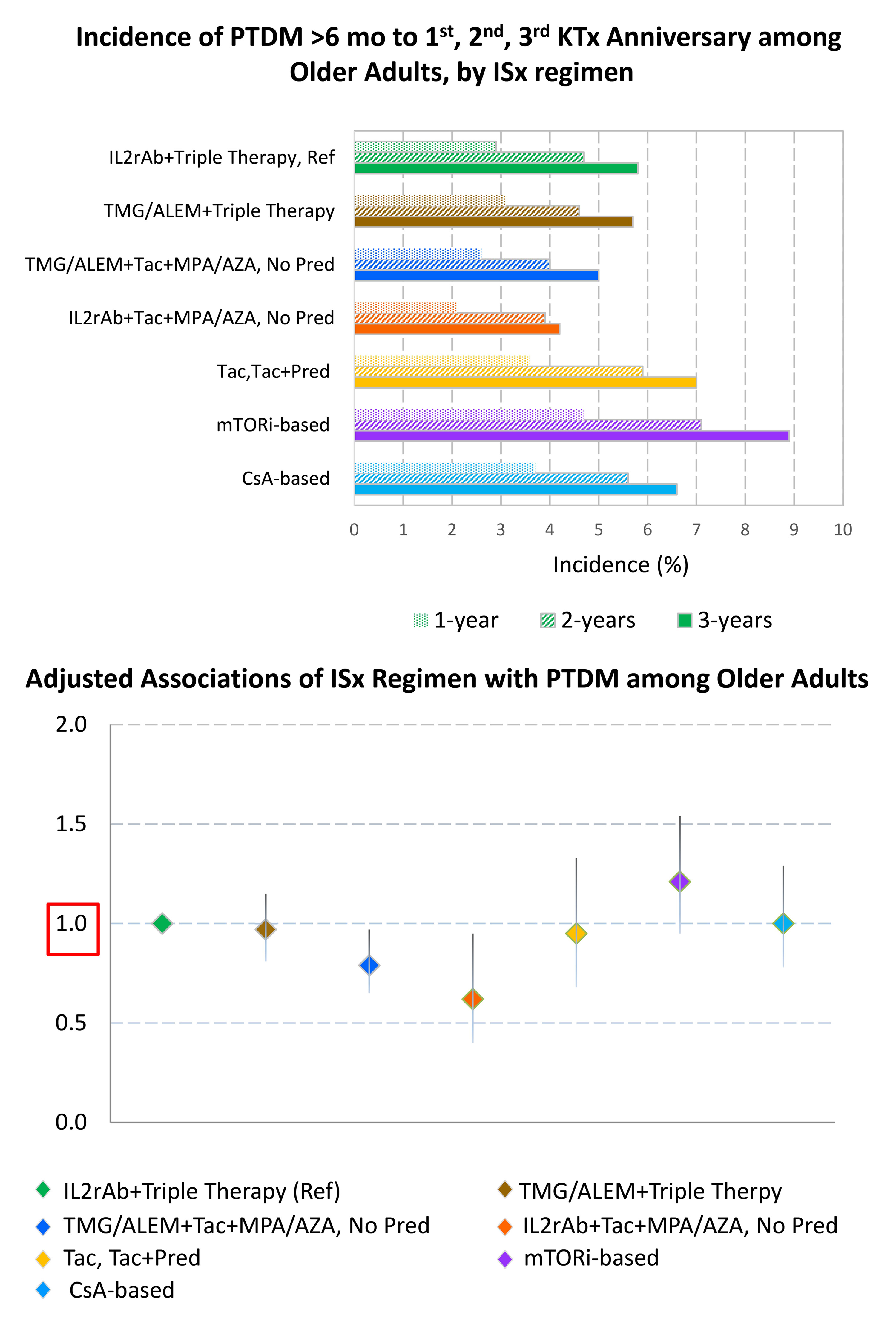Immunosuppression Regimen and Risk of Posttransplant Diabetes Among Older Kidney Transplant Recipients
1Saint Louis Univ, Saint Louis, MO, 2Johns Hopkins, Baltimore, MD, 3Univ of California, Los Angeles, Los Angeles, CA, 4Washington Univ, Saint Louis, MO, 5Drexel Univ, Philadelphia, PA, 6SRTR, Minneapolis, MN
Meeting: 2021 American Transplant Congress
Abstract number: 916
Keywords: Immunosuppression, Kidney, Outcome, Post-transplant diabetes
Topic: Clinical Science » Kidney » Kidney Immunosuppression: Desensitization
Session Information
Session Name: Kidney Immunosuppression: Desensitization
Session Type: Poster Abstract
Session Date & Time: None. Available on demand.
Location: Virtual
*Purpose: Posttransplant diabetes mellitus (PTDM) is a common complication after kidney transplantation (KTx), which may be exacerbated by immunosuppressive therapy (ISx). Older adults tend to have lower acute rejection risk due to immunosenescence but increased risk of non-immune complications, including PTDM. We examined associations of ISx and PTDM among adults 55 years and older using national US transplant registry data.
*Methods: We examined a linkage of Scientific Registry of Transplant Recipients (SRTR) and Medicare claims (2005-2016). Induction agent use was defined by registry reporting. Early maintenance ISx regimen was defined using Medicare pharmacy claims for ISx agents submitted within the first 6 months after transplant, and patients were classified into 7 regimens (Figure). Diabetes diagnosis was ascertained from Medicare claims. We modeled associations (95%LCLaHR95%UCL) of ISx regimen with PTDM >6 months to 3 years posttransplant, compared with a reference regimen of IL2-receptor antibody (IL2rAb) induction + triple maintenance (Tac + MPA mycophenolic acid: MMF or mycophenolate sodium)/azathioprine (AZA) + prednisone (Pred)) using Cox regression. Models were adjusted for potentially confounding differences in distributions of demographic and clinical factors using inverse probability of treatment weighting (IPTW).
*Results: Among 31,740 recipients aged >55 without pretransplant diabetes, 61% were men, 54% were white, 24.5% Black, and 15.2% Hispanic. Overall, 5.9% developed PTDM by 3 years. The unadjusted incidence of PTDM was lower among those who received TMG/ALEM+Tac+MPA/AZA,No Pred (5.0%) and IL2rAb+Tac+MPA/AZA,No Pred (4.1%) compared with the reference regimen (5.7%) but trended higher in those who received mTORi-based (8.9%) or CsA-based regimens (6.6%). After adjusting for potential confounding using IPTW, TMG/ALEM+Tac+MPA/AZA,No Pred was associated with 21% lower risk of PTMD (aHR, 0.650.790.97) and IL2rAb+Tac+MPA/AZA,No Pred was associated with 38% lower risk (aHR, 0.400.620.95).
*Conclusions: Steroid-free ISx is associated with lower risk of PTDM among older adult KTx recipients. Risk of non-immune complications should be considered along with rejection risk in tailoring immunosuppression choice in older adults.
To cite this abstract in AMA style:
Lentine K, Ahn J, Demarco MMcAdams, Xiao H, Bunnapradist S, Segev D, Axelrod D, Bae S, Dharnidharka V, Caliskan Y, Chang S, Hess G, Snyder J, Schnitzler M. Immunosuppression Regimen and Risk of Posttransplant Diabetes Among Older Kidney Transplant Recipients [abstract]. Am J Transplant. 2021; 21 (suppl 3). https://atcmeetingabstracts.com/abstract/immunosuppression-regimen-and-risk-of-posttransplant-diabetes-among-older-kidney-transplant-recipients/. Accessed February 16, 2026.« Back to 2021 American Transplant Congress

